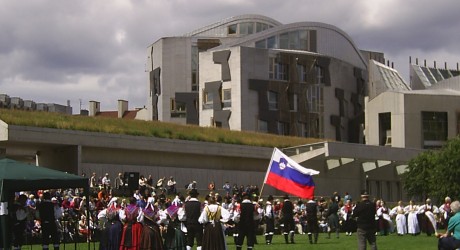STARTING this Sunday, Scotland’s longest-running international folk dance festival takes place in Edinburgh, Falkland, Stirling, and for the first time, Glasgow.
Run every two years, the festival includes performers from Spain, Sweden, Austria and Scotland in 2011.
The two organising dance groups – Dunedin Dancers and New Scotland cover the full range of Scottish dance styles – country dance, ceilidh, highland and step.
Agrupación Folklórica Celme, from Pontevedra in Spain last visited Scotland in 1995.
Akademiska Folkdanslaget from Sweden and Volkstanzgruppe Sankt Martin from Austria are participating in the festival for the first time.
Most of the performances taking place 24-30 July, are free though some require admission fees to the venue such as Falkland and Stirling palaces.
A feature of the Festival is the opportunity for the group participants to learn each other’s dances and join in social activities as well as performing.
Further cultural exchange is encouraged through participants being hosted by the local dance group members and supporters in Edinburgh and the surrounding area.
Notes to editors:
- For more information and photos: contact Rosalie tel: 07827 690 934 or visit: www.dunedindancers.org.uk/public/fest2011.php
- The festival is funded by fundraising activities conducted by the two organising dance groups – Dunedin Dancers and New Scotland, ticket sales and donations from performances and run by volunteers.
Schedule of 21st Dunedin International Folk Dance Festival Performances
Sunday 24th July – FALKLAND PALACE, Palace Gardens (weather permitting)
Parade 2 pm, dancing 2:15 to 4:15 pm.
Admission to National Trust for Scotland £11 / £8
Monday 25th July EDINBURGH, Scottish Parliament. (weather permitting)
Parade down the Royal Mile 12:30 pm, dancing 1 to 3 pm, admission free EDINBURGH, Scottish Storytelling Centre Dancing 2:15 to 3:45 pm, admission free
Tuesday 26th July EDINBURGH, The Mound (weather permitting)
Parade 1:30 pm through Princes Street Gardens, Dancing 2 to 4 pm, admission free
Thursday 28th July GLASGOW, George Square (weather permitting)
also in St Andrews in the Square. Dancing 12 to 2 pm, admission free
Friday 29th July EDINBURGH THEATRE PERFORMANCE, Church Hill Theatre
7:30 pm. Tickets are now for sale on line at The Hub or by phone on 0131 473 2000 Tickets cost £10 and £8 for adults, or £8 and £6 for senior citizens, children and students.
Saturday 30th July STIRLING CASTLE, Queen Anne Garden (weather permitting)
also Chapel Royal and Great Hall. Parade 1:30 pm, dancing 2 to 4 pm.
Admission to Historic Scotland Castle £13 / £10 / £6.50
More information about the groups involved:
Agrupación Folklórica Celme – Pontevedra, Spain
Agrupación Folklórica Celme was founded in 1984 by Enrique Dominguez Lino, a native of Pontevedra and current President and Artistic Director of the Association, concerned about maintaining traditional Galician culture.
Currently, the Association consists of 40 elements, including ballet, singing and instrumental group. They have a school dance, singing, tambourine, bagpipe, drum and other traditional instruments, consisting of over a hundred children between four and 15 years.
They have had many performances representing Galicia and Spain in numerous national and international folk festivals. As a result of their research, they have a large collection of dances, canticles and music for many regions of Galicia, covering more than three centuries. http://perso.wanadoo.es/afcelme/
The Academic Folkdance Society – Stockholm, Sweden
The Academic Folkdance Society was founded in 1937 by students at the University of Stockholm. Many members continue dancing long after they have finished studying, as a result there is a great range of ages among the dancers.
The Society mostly dance Swedish folk dances and play Swedish folk music. In their repertoire you will find: folkdances, aristocratic dances such as gavotte and francaise · couple dances, oldtime dances and ‘polska’ (dances well established in the Swedish villages but believed to be at least partly of Polish origin) and engelskor (dances brought to Sweden by English sailors).
They also do other things together such as play folk music, go out walking, skiing, and practise their dances through ‘lekstugor’ (dance evenings), parties and dance houses. http://www.akademiskafolkdanslaget.se/engelska.shtm
Volkstanzgruppe Sankt Martin im Sulmtal, Steiermark, Austria
Founded in 1974 the Volkstanzgruppe (VTG) St. Martin i. S. aims to preserve Styrian tradition, songs, dances, music and theatre. The group takes part in the cultural life of the region and is interested in any cultural exchange. Numerous tours have taken the VTG not only across Europe but also to the Far East and North America. Folk groups from many nations have then been hosted in in the group’s home village St. Martin i. S.
Their dancers perform dances of the Alpine countries, mainly Austrian dances. One feature is the men of the group cracking whips, as well as a sword dance of minors and flag waving. In 1998 the VTG organized the 7th International Meeting of Flag Wavers in St. Martin i. S. and in 2004 the group was the organizer of an International Sword Dance Festival.
From its many and diverse activities the VTG St. Martin i. S. has achieved a very good reputation at home and abroad. Along with the group the name ‘St. Martin i. S.’ has become well-known in many countries, arousing the interest of many in visiting this lovely area in the western part of Styria. http://www.st-martin-sulmtal.gv.at/VTG-english.121.0.html
Dunedin Dancers
Dunedin Dancers was set up initially over 40 years ago to organise an International Folk Dance Festival every two years. Over time they have grown to include a regular weekly get together to dance, perform demonstrations and run other social activities, based in Edinburgh. They have also been part of the Tattoo dance team when Scottish Country Dancing was on the programme.
Their dancing repertoire consists mainly of country dances in the traditional sets of three and four couples, but they also perform Highland Dancing, Scottish Step dancing (hard shoe) and ceilidh sets. The complexity of the performances lies mostly in the dance figures to the two different tempos in Scottish country dancing: fast (reels, jigs, and hornpipes) and slow (strathspeys). Music for their dancing is provided by accordion, fiddle and pipes. www.dunedindancers.org.uk
New Scotland – Edinburgh University
Founded as a student society 60 years ago, New Scotland continues its close relationship with Dunedin dancers as the graduate group it set up to run a regular International Folk Dance festival. It offers regular weekly classes in Scottish Country Dancing, Highland, Ceilidh and Scottish Step dancing mainly for students at the University, though non-students are also welcome.
New Scotland have organised the annual Intervarsity Folk Dance Fesitval (IVFDF) on more than one occasion which brings student folk dance societies and their members together on an annual basis for a weekend of workshops, performances and fun!.
Similar to Dunedin Dancers, New Scotland frequently perform in Folk Dance Festivals across Europe. The two groups often collaborate to send groups of dancers to these events and perform demonstrations locally. And of course, they combine their efforts to present the Dunedin International Folk Dance Festival experiences to the people of Scotland. www.newscotland.org.uk
MEDIA RELEASE posted by Voluntary Arts Scotland. You too can post media releases (aka press releases) on allmediascotland.com. For more information, email here.
Contact: Fiona Campbell
Phone: 0795 191 8366
Email: fiona@vascotland.org.uk
Website: http://www.dunedindancers.org.uk/public/fest2011







